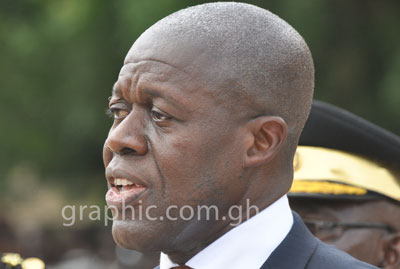Ghana safe for investment — Veep
 Vice-President Kwesi Bekoe Amissah-Arthur, has made a strong case for Ghana and assured the international business community that the country is a safe and secure place for investment.
Vice-President Kwesi Bekoe Amissah-Arthur, has made a strong case for Ghana and assured the international business community that the country is a safe and secure place for investment.
Advertisement
“We have a stable democracy and a safe political environment, coupled with economic stability, which make Ghana the new frontier for growth,” he said.
Mr Amissah-Arthur, who was addressing the 16th Eurosian Economic Summit in Istanbul, Turkey, said, “Ghana occupies a strategic geographical location for reaching the West African market.”
He was speaking on the theme: “Transforming Ghana’s economy through West African Integration”.
The summit is organised annually with the objective of enhancing relations among the European Union, countries in Central Asia, as well as the Middle East.
It is a gathering of high-level statesmen, experts, business leaders and private sector representatives from the Eurasian region, with an approximate population of 643 million and purchasing power of $6.551 trillion.
The Vice-President said since 1992, Ghana had recorded significant growth and prospects, pointing out that the country was the ninth largest economy in Africa and continued to increase its share of GDP on the continent.
Mr Amissah-Arthur admitted that sub-regional integration efforts had been weakened by ethnic tensions and wars in the 1990s, citing the civil wars in Liberia and Sierra Leone which turned back the clock of stability, progress and development and also claimed many lives and destroyed properties.
Those constraints, he said, had impeded growth efforts in the areas of energy, communications, transport, health, educational infrastructure, among others.
He, however, assured the investors that “now there is no record of civil wars and ethnic conflicts”, a situation which, he said, provided a serene environment for investment.
On the constraints to public investment in the sub-region, Mr Amissah-Arthur said many countries had gone through the Heavily Indebted Poor Countries (HIPC) process and did not want to add on to sovereign debt, adding, “So they don’t want to borrow to invest in infrastructure.”
“It is, therefore, possible for the private sector to come into our countries and do business. We want to target concessional credit for social sector investments and increase the mobilisation of domestic savings and channel this growth-enhancing investments into our countries. This is an area that requires a strong public/private partnership,” he said.
Story: Timothy Gobah




